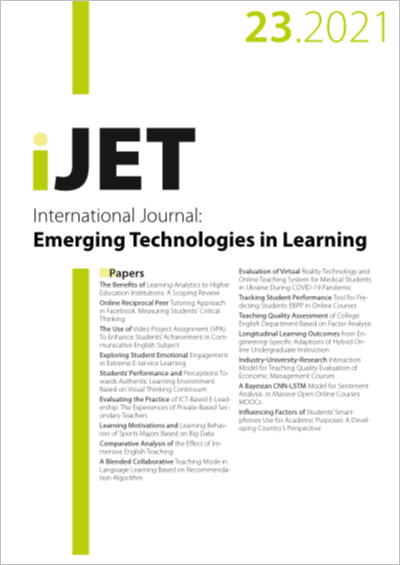A Blended Collaborative Teaching Mode in Language Learning Based on Recommendation Algorithm
DOI:
https://doi.org/10.3991/ijet.v16i23.27253Abstract
With the continuous expansion of economic globalization, English, as the official language in the world, has a high popularity. It can be related to a better development in the future. Meanwhile, with the continuous progress of technology in modern society, multimedia online teaching has become the main means in colleges and universities, which especially brings great changes to foreign language teaching. However, foreign language teaching is facing many difficulties such as large number of contents, less lessons and low participation of students in class. Therefore, the reform of college foreign language teaching is imperative. Based on blended collaborative teaching mode, the paper has designed a “Three Classes” composed of “Communication Class”, “Famous Teacher Class” and “Elite Online Class”. Teaching process has been designed according to the cognitive process of “Previewing before class, consolidating in class and expanding after class”. In addition, recommendation algorithm has been used to collect data on four dimensions, namely, involvement in foreign language learning, content completion of foreign language learning, interaction in foreign language learning and effectiveness of foreign language learning. A performance evaluation system for foreign language learning supported by big data has been established. The results of teaching practice have proved that the blended collaborative teaching mode implemented in the study can be integrated into the whole teaching process through intelligent data analysis, information sharing and technology application, improving teaching quality, enhancing the interaction between teachers and students, which is worthy of promotion and application.
Downloads
Published
2021-12-08
How to Cite
Wang, T. (2021). A Blended Collaborative Teaching Mode in Language Learning Based on Recommendation Algorithm. International Journal of Emerging Technologies in Learning (iJET), 16(23), pp. 111–126. https://doi.org/10.3991/ijet.v16i23.27253
Issue
Section
Papers
License
Copyright (c) 2021 Ting Wang

This work is licensed under a Creative Commons Attribution 4.0 International License.


